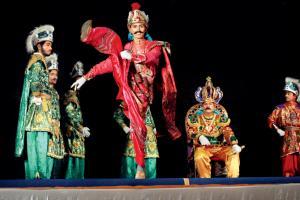Behind today's Chavittunatakam performance in Mumbai is the story of how artistes came together to support practitioners of the maritime theatre tradition, who lost everything to the Kerala floods

Chavittunatakam performances are often based on Biblical stories and feature Christian heroes
The arrival of a long-term foreign influence on the shores of a country is often defined as invasion. History is replete with chronologies of battles lost and won, as it ought to. But the complexities of everyday interaction between the foreigners and locals are more layered and less black-and-white than what documentation accounts for, which also runs the risk of systemic cleansing from time to time.
ADVERTISEMENT
An example of one such layered exchange between the Portuguese missionaries and the fisherfolk of Kerala in the 16th century manifests to this date in Chavittunatakam, said to be the only existing maritime theatre tradition in the world.

The stamping dance form, a unique blend of aesthetic elements from India and Europe, has had its crests and troughs of survival - what with its 500-member strong community residing in island villages in Ernakulam and Alappuzha districts. The most recent challenge being the devastating floods in Kerala, where the artistes lost their costumes, props and music instruments, along with their homes. Today, as 28 artistes of one of the Chavittunatakam troupes are set to perform in the city, they arrive with the hope of acquainting Mumbaikars with the theatre tradition, and also showcase what concerted efforts of artistes can do for struggling art forms.

Swapnokalpa Dasgupta
"When the calamity struck, I spoke to the dance community in the city about what could be done. We decided to do a show for artistes, by artistes, and several noted dancers including Shubhada Varadkar ji and Lata Surendra ji performed with their troupes at a multi-classical dance fundraiser in September 2018," says Swapnokalpa Dasgupta, head of dance programming, NCPA. "When it came to donating the funds, our chairman Mr Khushroo N Suntook was keen that the proceeds go towards artistes of a dance form that already needs preservation," she adds, pointing to the fact that the history and nuances of Chavittunatakam have little documentation and are passed down directly from the guru to the disciple. And so, they collaborated with Kerala Sangeetha Nataka Akademi (KSNA) that helped channel funds towards the dance troupes.
"Art is not the first concern that comes to mind when the question is one of survival in the wake of a disaster. But here, with the artistes getting affected, it was the entire dance form that was under threat," says Priya Varghese, chairperson, KSNA, Western Zone, referring to the concentration of the community in an inundated area, and its reliance on heavy and expensive costumes, which got destroyed.
The lives and practice of the dance troupes are returning to normalcy gradually, with help from individual artistes and other institutes coming in, too. In December, a group from Gothuruth village performed at the Serendipity Arts Festival in Goa, and now, another group brings Ischakki, the story of a Sicilian king, with the underlying Biblical message of how desires can lead to sin. In fact, most Chavittunatakam stories are rooted in the Bible, and have Christian heroes. A popular play in the tradition, interestingly, is called Daveedhum Goliyathum, based on the story of David and Goliath. "As a dancer myself, I was also interested in this unique tradition, as the more popular dance forms from Kerala depict stories from Hindu mythology," Dasgupta shares.
"The foot-stamping performance, where resonant, percussive sounds are produced to accentuate the dramatic situation being depicted, is a spectacle with its European operatic aesthetics, Tamil-Malayalam songs and the fighting-fencing sequences inspired by kalaripayattu," explains Varghese. It's a remnant of a cultural exchange that Kerala nurtures long after the Portuguese left its shores.
ON: Today, 5 pm
AT: Experimental Theatre, NCPA, Nariman Point.
CALL: 22824567
Catch up on all the latest Mumbai news, crime news, current affairs, and also a complete guide on Mumbai from food to things to do and events across the city here. Also download the new mid-day Android and iOS apps to get latest updates
 Subscribe today by clicking the link and stay updated with the latest news!" Click here!
Subscribe today by clicking the link and stay updated with the latest news!" Click here!






